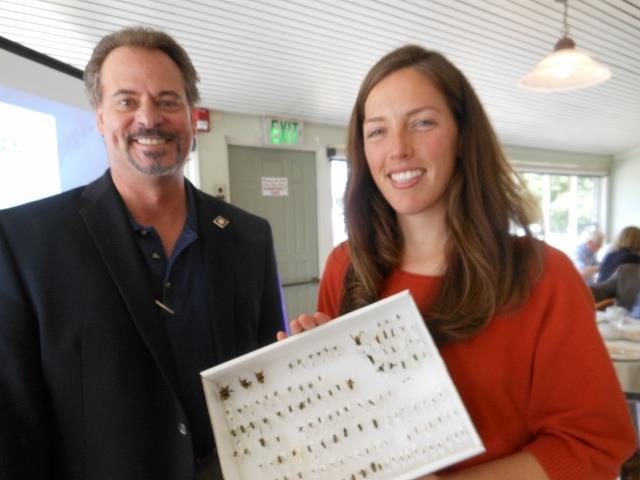Bee decline
Posted by Pamela Arnsberger
on Jun 02, 2016
June 2nd 2016 meeting
Announcements and Reminders
Three Rotarians of the Week include Doug, Karen and Sandra for working so hard at the music festival!
On July 28th the District Board Governor is coming here. Board members should be here at 11:00.
Roast and Toast is on June 23rd. Sign up on the website (events.rotary.org) It’s $37 and it’s an open bar!
Keith’s party will be Sunday June 26th.
Claire McAdams announced the list of grantees. Grants will awarded on June 23rd at a luncheon will be in the big room. $18,450 in total will be awarded.
Doug Deaver announced that we made $1535 in tips for a net of $6200 at the Aptos Music Festival. Also he said we gave four scholarships each to Aptos and Soquel high graduating students.

Our speaker today was Hamutahl Cohen a PhD candidate from UC Santa Cruz. She spoke to us about wild and native pollinators (bees!). She is currently conducting research in bee/microbe interactions in gardens along the coast, focusing on the problem of bee decline.
Ms Cohen explained that bees are covered with hair to collect pollen. Pollination moves around the pollen to flowers and fruit. 35% of crops depend on this process. Pollination services are values at 200 billion a year. We have 4000 species in North America and just over 50 species in California.
We use 4 types agriculturally : honey bees, bumblebees, alfalfa bees and mason or orchard bees. Bees are very diverse: some are social (only 10%), 75% are solitary, 15% are cuckoos ( they lay their young in other bees nests and eat their pollen and nectar). Some live in the ground, some in cavities above ground (in wood like carpenter bees). There are orchid bees that collect fragrances. A Turkish bee collects rose petals to make its nest.
In 2014 -21015 we have experienced a 45% loss in bee colonies. Causes include pathogens, parasites, invasive species, pesticides (Neonix is one), migratory beekeeping (thru shipping fever), habitat loss, simplified pollen diets, (not enough to eat) and climate change.
Ms Cohen explained that the focus of her research is on habitat loss. She said in urban gardens a lot of natural habitat has been converted into concrete and pavement and a mosaic of land use. Her research question is: Does this change in habitat affect bee diversity, survival and microbe interaction (as measured by looking at presence of microbiomes). She has studied 19 urban gardens from San Jose to Monterey. Results are pending.
What can we do? (1) Work with domesticated bees from local breeders. (2) Have plant pollinator friendly gardens which include native plants in aster family, cosmos, salvias, sunflowers, lavenders, mints, thyme, borage, buckwheat, berries and fruit trees.(3)Use mason bees. (4) Build insect hotels: logs with holes drilled in them. She said we can buy bees at pollinatorparadise.com. (5) Support local beekeepers and advocate for bee issues and support her research. For more information see her website: Tinyurl.com/beeguts